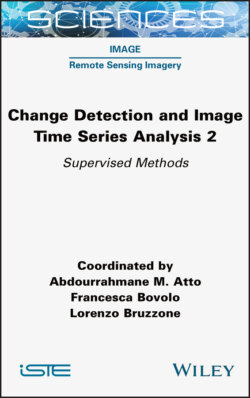Читать книгу Change Detection and Image Time Series Analysis 2 - Группа авторов - Страница 2
ОглавлениеTable of Contents
1 Cover
2 Title Page
3 Copyright
4 Preface
5 List of Notations
6 1 Hierarchical Markov Random Fields for High Resolution Land Cover Classification of Multisensor and Multiresolution Image Time Series 1.1. Introduction 1.2. Methodology 1.3. Examples of experimental results 1.4. Conclusion 1.5. Acknowledgments 1.6. References
7 2 Pixel-based Classification Techniques for Satellite Image Time Series 2.1. Introduction 2.2. Basic concepts in supervised remote sensing classification 2.3. Traditional classification algorithms 2.4. Classification strategies based on temporal feature representations 2.5. Deep learningapproaches 2.6. References
8 3 Semantic Analysis of Satellite Image Time Series 3.1. Introduction 3.2. Why are semantics neededin SITS? 3.3. Similaritymetrics 3.4. Feature methods 3.5. Classification methods 3.6. Conclusion 3.7. Acknowledgments 3.8. References
9 4 Optical Satellite Image Time Series Analysis for Environment Applications: From Classical Methods to Deep Learning and Beyond 4.1. Introduction 4.2. Annual time series 4.3. Dense time series analysis using all available data 4.4. Deep learning-based time series analysis approaches 4.5. Beyond satellite image time series and deep learning: convergence between time series and video approaches 4.6. References
10 5 A Review on Multi-temporal Earthquake Damage Assessment Using Satellite Images 5.1. Introduction 5.2. Satellite-based earthquake damage assessment 5.3. Pre-processing of satellite images before damage assessment 5.4. Multi-source image analysis 5.5. Contextual feature mining for damage assessment 5.6. Multi-temporal image analysis for damage assessment 5.7. Understanding damage following an earthquake using satellite-based SAR 5.8. Use of auxiliary data sources 5.9. Damage grades 5.10. Conclusionand discussion 5.11. References
11 6 Multiclass Multilabel Change of State Transfer Learning from Image Time Series 6.1. Introduction 6.2. Coarse- to fine-grained change of state dataset 6.3. Deep transfer learning models for change of state classification 6.4. Change of state analysis 6.5. Conclusion 6.6. Acknowledgments 6.7. References
12 List of Authors
13 Index
14 Summary of Volume 1
15 End User License Agreement
Guide
1 Cover
2 Table of Contents
3 Title page
4 Copyright
5 Preface
6 List of Notations
7 Begin Reading
8 List of Authors
9 Index
10 Summary of Volume 1
11 End User License Agreement
Pages
1 v
2 iii
3 iv
4 ix
5 x
6 xi
7 xiii
8 1
9 2
10 3
11 4
12 5
13 6
14 7
15 8
16 9
17 10
18 11
19 12
20 13
21 14
22 15
23 16
24 17
25 18
26 19
27 20
28 21
29 22
30 23
31 24
32 25
33 26
34 27
35 28
36 29
37 30
38 31
39 32
40 33
41 34
42 35
43 36
44 37
45 38
46 39
47 40
48 41
49 42
50 43
51 44
52 45
53 46
54 47
55 48
56 49
57 50
58 51
59 52
60 53
61 54
62 55
63 56
64 57
65 58
66 59
67 60
68 61
69 62
70 63
71 64
72 65
73 66
74 67
75 68
76 69
77 70
78 71
79 72
80 73
81 74
82 75
83 76
84 77
85 78
86 79
87 80
88 81
89 82
90 83
91 84
92 85
93 86
94 87
95 88
96 89
97 90
98 91
99 92
100 93
101 94
102 95
103 96
104 97
105 98
106 99
107 100
108 101
109 102
110 103
111 104
112 105
113 106
114 107
115 109
116 110
117 111
118 112
119 113
120 114
121 115
122 116
123 117
124 118
125 119
126 120
127 121
128 122
129 123
130 124
131 125
132 126
133 127
134 128
135 129
136 130
137 131
138 132
139 133
140 134
141 135
142 136
143 137
144 138
145 139
146 140
147 141
148 142
149 143
150 144
151 145
152 146
153 147
154 148
155 149
156 150
157 151
158 152
159 153
160 154
161 155
162 156
163 157
164 158
165 159
166 160
167 161
168 162
169 163
170 164
171 165
172 166
173 167
174 168
175 169
176 170
177 171
178 172
179 173
180 174
181 175
182 176
183 177
184 178
185 179
186 180
187 181
188 182
189 183
190 184
191 185
192 186
193 187
194 188
195 189
196 190
197 191
198 192
199 193
200 194
201 195
202 196
203 197
204 198
205 199
206 200
207 201
208 202
209 203
210 204
211 205
212 206
213 207
214 208
215 209
216 210
217 211
218 212
219 213
220 214
221 215
222 216
223 217
224 218
225 219
226 220
227 221
228 223
229 224
230 225
231 226
232 227
233 228
234 229
235 230
236 231
237 232
238 233
239 234
240 235
241 236
242 237
243 238
244 239
245 240
246 241
247 242
248 243
249 244
250 245
251 247
252 248
253 249
254 250
255 251
256 253
257 254
258 255
259 256
260 257
261 258
